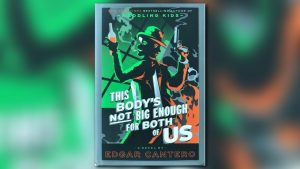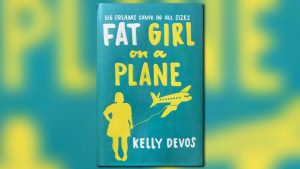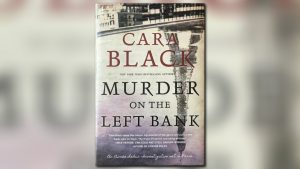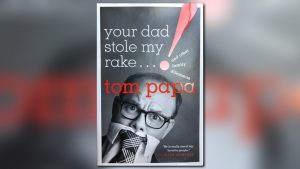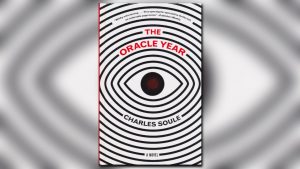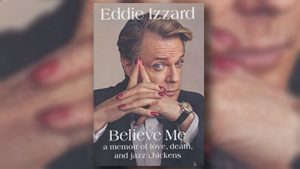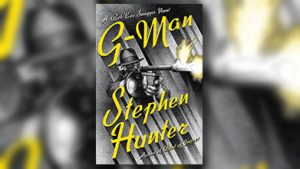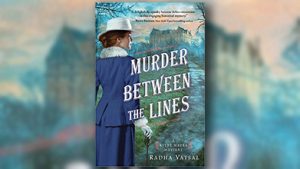In Live Right and Find Happiness, Dave Barry passes on his life lessons and truths to his daughter and grandson.
In this comedic book, Barry touches on old and new topics, from his life in the baby boomer generation, to Google Glass, to his thoughts on high school.
Humor guides the novel in which he reflects on his theory of the life he has lived and the people around him.
VO: And now, an Eight original production. "Books & Co." is made possible by the Department of English at Arizona State University and by the Friends of Eight, members of Eight, Arizona PBS, who give additional gifts to support original programs. Thank you.
ALBERTO RIOS: Welcome to "Books & Co." Bienvenidos, todos. I'm your host, Alberto Ríos. We're joined today by best-selling author and humorist by Dave Barry who will be talking about his book, "Live Right and Find Happiness: Although Beer is Much Faster,” published by Putnam. Welcome, Dave.
DAVE BARRY: Gracias. Actually, I live in Miami so a lot of Spanish-speaking there and as it happens my wife is Cuban. She's Cuban Jewish, Jew-ban they call it. My joke is they didn't come on rafts, they parted the Caribbean. My daughter speaks fluent Spanish. I have learned to say in fluent
Spanish just a moment, my wife speaks Spanish.
ALBERTO RIOS: I'm excited to talk about this book. I have no idea how to talk about this book but I laughed through it.
DAVE BARRY: The key there.
ALBERTO RIOS: We can start with a synopsis of how you work, what's in that book?
DAVE BARRY: I used to write a weekly newspaper humor column. And it was rewarding and I enjoyed it and it was a good career but it was a little bit constraining in that every week, I had to produce words basically. And so there's that restraint, the time restraint, the length restraint and it was a newspaper column. So about years ago, I stopped doing that and switched over to writing more fiction and essays where I can expand a little bit, sometimes, quite a bit, and write like in the form of a screenplay if I want or poetry if I want. And so this book is a collection of original essays, and theoretically, I mean it has a title which mentions happiness but that's an afterthought. What I do --
ALBERTO RIOS: Happiness is an afterthought.
DAVE BARRY: It is! Well, when I write the essays, I write whatever comes to mind or whatever I'm interested in. I took some trips and I wrote about those but when it comes time to publish the book, the publishing people always want there to be a title and a theme, it's got to be about something.
ALBERTO RIOS: They're so picky.
DAVE BARRY: And then they want a cover. And always think the title should be “Here's Another Book
from Dave Barry,” you know. It's really...
ALBERTO RIOS: That leads to my next question. Psychological thriller? It's probably not that.
DAVE BARRY: Definitely not.
ALBERTO RIOS: But there is such a thing I think as a “Dave Barry book,” at least the essay books. They are on a wavelength, and I think there is a continuum between them and they're
humorous.
DAVE BARRY: Yeah! That's the idea.
ALBERTO RIOS: But they are now -- I think they are -- they've either risen above or sunk below playing humor. They're doing other things. And I think one of the intriguing things to me as I'm reading through this and laughing is man, you throw your family under the bus here!
DAVE BARRY: Well, sort of. I have -- I've always written about my family.
ALBERTO RIOS: I'm only teasing.
DAVE BARRY: I know you are but I'm aware they are likely going to read what I write. And so I like to think that generally when I write about the family, the person being made fun of is me, God forbid I should make fun of my wife. But with my kids I have always written about my kids and I've always had this deal with them, if I write something, and I'll show it to you, if you're uncomfortable, we won't publish it and then you can get someone else to pay for your college education. [laughter] This is what dad does! No, I am generally -- I'm somewhat if not a lot aware – I don't want them to become objects of derision because of something I've written about them.
ALBERTO RIOS: You handle it in ways that they want to be part of that book.
DAVE BARRY: They're used to it. They do kind of like it. My son is grown up now but my daughter is… she's in high school. She'll sometimes roll her eyes because she's a 16-year-old girl but she kind of likes it.
ALBERTO RIOS: So there is a Michelle and a Sophie. [laughter]
DAVE BARRY: In the Dave Barry witness protection program. No, no they're for real. Michelle is my wife, she's a sports writer at the Miami Herald. And Sophie is really my daughter. And I have a son, Rob, and he is actually a dad himself now.
ALBERTO RIOS: So your wife is a writer. Is she funny?
DAVE BARRY: She's funny but she doesn't write funny. Sports writers, they're more about speed and accuracy than humor, although there are funny sports writers. She has a very good sense of humor, I think. You know. I try to make her laugh.
ALBERTO RIOS: Let me return for a moment, because I'm intrigued by the idea that there is such a thing as a Dave Barry book. We have a genre, psychological thriller as I said or detective fiction or whatever. I'm wondering how you feel if I were to say that there is such a thing as a genre called Dave Barry-ness or a Dave Barry book.
DAVE BARRY: In the sense that I wrote them.
ALBERTO RIOS: It's a contemporary American humor, it's clearly speaking to boomers.
DAVE BARRY: It's a baby boomer sensibility and it tends towards silliness rather than deep insight and I've always distinguished between satire and humor. To me, I read -- I was an English major and I came to believe satire was what we call humor that is not funny. Jonathan Swift, satire, basically one joke and you don't ever really laugh out loud. And then there's humor. Mark Twain was more humor I think. But my idol in humor writing will be people that actually made you laugh and you could tell they were more interested in making you laugh than making you think about any particular issue or agree with them on any particular point. And I always thought that is the kind of humor I like to do. It's not that I don't have opinions, I just don't feel my job is to inflict my opinions on people or convince them that I'm right. My job is to entertain them.
ALBERTO RIOS: How do you know what's funny? You have a very particular approach to what's funny, and it's not that it's redundant. You're always finding new things but within a certain mindset and I'm just wondering how do you recognize it? Where is it? Where do you go hunting?
DAVE BARRY: It's really something developed over a long, long time. You start with whatever your natural sense of humor is, what you find amusing. And then the process is to find a topic where you can see something funny and figure out a way to word it so people are seeing it the way you're seeing it. And to me, it takes a long, long time. I'm a very slow writer, very laborious writer. So typically when I think is something funny in the abstract, by the time I have it worded the way I like it, I am so familiar with it that it doesn't seem funny to me at all! You know, the question then becomes did I execute it the way I wanted to? But I rely on the fact that I thought it was funny at the beginning, will carry through if I execute it right it will strike somebody who sees it for the first time as funny the way it did me, if that makes sense.
ALBERTO RIOS: I'm fascinated to hear you say that you revise to the extent that you do.
DAVE BARRY: I'm a very, very slow writer.
ALBERTO RIOS: Humor seems spontaneous.
DAVE BARRY: It should, and in some ways, some of it is the very first germ of it usually is but when you actually present it to somebody else in written form, I don't think you can do that without a fair amount of work. I compare it to standup comics. If you go see a good standup comic, he will give you the illusion or she, we'll say most of them are guys, he'll give you the illusion that he is just thinking of this stuff on stage. He's cracking it. And riff after riff, it's one after another, but the truth is he probably honed whatever routine that is over hundreds if not thousands of hours and has every pause and inflection worked out in his mind and it wasn't as funny the first dozen or hundred times he did it as it is now that he really knows how to do. I think writing humor is very much the same way or magic tricks. You see a guy pull a quarter out of your ear, he didn't just do that. He spent a long-time practicing that. But if it's going to work as humor, it needs to look kind of spontaneous.
ALBERTO RIOS: There's a very funny literary anecdote where a South American film writer was visiting Andre Breton, waiting in his study, and Breton is typing something and he crumples it up and throws it away and when he finally gets it, he says I'm so glad to see you but what were you working on? He said “automatic writing.” “But you're crumpling it up and throwing it away,” and he says “it wasn't automatic enough.” It's an age-old trick, right? It's hard work.
DAVE BARRY: Well, the old saying, write hard, read easy, write easy, read hard. I see stuff all the time that I know is supposed to be funny, people send me stuff and they just dashed it off and that's exactly how it reads. It doesn't work that well. Speaking can work. Sometimes, you can have a few beers in a bar. But it's a much simpler kind of humor than written humor, it tends to be a little bit more complicated in structure.
ALBERTO RIOS: You return to a lot of themes. Part of the humor, it's a good storytelling technique where you bring up something here, you return to it later often at the end and it catches us off-guard because you led us astray. Works very well. One of the things about the humor, though, and it is maybe countercurrent, it's not what is going on. You do no damage. It's not just about your family. I think in general it's a genial humor. It's often at a cost to yourself.
DAVE BARRY: Yeah, there's a lot of really nasty humor. The Internet is aflame, and it can be very, very good. It can be very funny, it can be very well done but there's a lot of really hostile, angry, nasty humor. That's just not me. Partly it's just not me anyway. That's not my -- partly it's because I came up through the newspaper business, where you didn't do that. You want your readers to be engaged. And I think in the end, it lasts longer if it doesn't feel angry and it doesn't feel hurtful, you know. It may be sort of satisfying immediately if it's aimed at somebody you don't like but people feel better laughing about something that doesn't have a really negative component. Not to say that I haven't done that. Everything I ever say I've probably violated at some point or another. I like to think that I'm more silly and quirky than angry.
ALBERTO RIOS: We'll talk about the Belgians in just a moment.
DAVE BARRY: I hate the Belgians!
ALBERTO RIOS: I would like to remind the viewers that you're watching "Books & Co.," I'm your host Alberto Ríos and we're joined by Dave Barry talking about his latest book, "Live Right and Find Happiness: Although Beer is Much Faster.” So this idea of difficult humor where it's aimed at somebody. You do have some humor aimed at the Belgians.
DAVE BARRY: One of the essays is about soccer and the World Cup. My wife is a soccer writer and through her I've become a big fan of the sport of soccer. My daughter plays a different level of soccer, she's on a travel soccer team. She's…and the way that works is every weekend, you get in a car and drive at least 200 miles to play some other team that has also driven at least 200 miles, sometimes, everybody started at the same place. It has to be raining wherever you end up. That's the other rule. If you ever want to end the drought in California or sub-Saharan Africa, just schedule my daughter's soccer team. My wife goes to the World Cup every four years. And Sophie and I go visit. We went to Brazil, and we went to a game that was in the -- what was it, the quarterfinals I guess, where they had to play the Belgians and if they won that, they would advance and if they lost, they were out of the World Cup. So the Belgians were our enemies and, you know, typically in the World cup, it's like we would go to a game, it was Colombia versus Uruguay and they hate each other. The fans really hate each other and they have chants and there are fights in the stands. We wanted to get that going with us and the Belgians. But the problem was we're Americans, we don't even know where Belgium is. We don't know any Belgians. We know they have chocolate, which doesn't seem like such a bad thing. So a bunch of us went to a bar in Rio and tried to come up with reasons to hate Belgium and we tried to develop chants. And the one chant I came up with is hey, Belgium, you can go to hell-gium. It didn't catch on.
ALBERTO RIOS: It's still waiting.
DAVE BARRY: It's got some -- yeah and we get to the game, and there's all these Belgians and they're the sweetest people in the arena and they're very cultured and they all speak English better than we do and they're saying good luck. So they made it hard for us and they won, which really was annoying.
ALBERTO RIOS: On top of it all.
DAVE BARRY: On top of it all.
ALBERTO RIOS: You have in the midst of this humor, I would say more than what you might admit to, more than a slight amount of tenderness, and I think it's especially aimed at your daughter. You brought her up several times and high school girls generally, and I think you talk about what they love and you talk about it, it's just a few lines but I think you say it just in a way that mattered to me. I got it and it was nice to hear that.
DAVE BARRY: You get to observe, because of soccer, we drive to practices a lot so it's a carpool thing. So I spend many, many, many hours driving a car containing five, six, seven, or 16-year-old girls and they forget you're there. The Google car that's supposed to be able to drive itself. They don't pay any attention to the fact that there is an adult driver. They're all busy texting, usually, they're texting each other and they've got the radio cranked up to million decibels and they're singing along to these hideous songs. They chatter away. And they're really wonderful. They're a wonderful life form, young girls. Girls, they're just sort of so outgoing, they're so unaffectedly affectionate to each other and they talk about whatever is on their mind. And I really like being able to peek into that world, although sometimes, it's a little terrifying. But mostly I like it.
ALBERTO RIOS: Speaking of terrifying, there's a very funny also moment in the book. It's not about tenderness exactly but you talk about going on a trip to Russia. And you get that moment where you're brought into this auditorium with professors and students who are going to ask you about your themes and different stuff in your work.
DAVE BARRY: Yeah. We went with the State Department sent me and Ridley Pearson, a coauthor of a couple of young adult books. We went to Russia as part of a program by the State Department that's supposed to improve relations between the two countries which clearly isn't working. I just hope they don't send us to Iran next, you know. But we spoke to university students, we spoke to authors, we spoke to library groups. And it was very intimidating because the Russians are serious about literature. And pretty well educated and they know their classics in a way we don't know ours over here. And their modern literature doesn't compare to ours I don't think. It's not as big a deal, their publishing industry isn't as active as ours but their literature, you know, they're serious about that stuff. They know their poets, they know their playwrights and novelists. We're trying to explain what we do and we have to do it through an interpreter which makes it even worse. I'm supposed to be a humor writer so like it's kind of hard to get a joke across when you have to stop every four words and hear it translated to Russian. And we had slides, we would show them slides which were designed to help them get what we did and how we wrote this book together and one of my slides --
ALBERTO RIOS: Humorous slides?
DAVE BARRY: There were, some of them. I was trying to say I wrote newspaper columns and I do wacky things, we don't have that over there.
ALBERTO RIOS: No wacky things.
DAVE BARRY: They don't do wacky, the Russians. One of the slides, I wrote a column years ago, when my son was in middle school, to embarrass him. I picked him up in school in the Oscar Meyer wiener mobile. And he was embarrassing and the loud speaker is going Rob Barry report to the wiener mobile. The Russians, they don't get it. They don't have the wiener mobile, they don't have anybody like me who's not imprisoned. And so I'm showing this slide right after I picked Rob up and I'm at the wheel of the wiener mobile and Rob is standing in front of it looking very sheepish and the Russians are staring at this and can tell they're thinking how the hell did we lose the Cold War to these people?
ALBERTO RIOS: The wiener mobile. You have -- you go farther in really talking about high seriousness where you say true fact, in writing this essay, I tried to read the Wikipedia plot synopsis of the “Brothers Karamazov” and I can't even get through that.
DAVE BARRY: One of the questions that kept coming up in Russia which would terrify me every time, the questions were serious and they would say -- they always knew Hemingway, Faulkner, they would say what Russian authors do you read? And Ridley, fortunately had read “Crime and Punishment” and so I would always immediately look to him when that question would come up and he would talk about “Crime and Punishment” and he would talk long enough, they would forget to ask me and sometimes, they would say what about you? And I would say --
ALBERTO RIOS: I'm with him.
DAVE BARRY: I would say well in college, I read Dostoyevsky, I read only 20 pages of it, and it's,
1000 pages long. I was busy in college.
ALBERTO RIOS: That co-editor Mr. Cliff.
DAVE BARRY: A lot of stuff going on. And I'm not even sure that Dostoyevsky finished the book. It was kind of a lie because I hadn't read. And in the book, I decided to look up the plot summary and I couldn't finish it. It was too long for me.
ALBERTO RIOS: Beyond writing the book, I can't imagine that people must always expect you to be funny. It was Edmond Kean who said “Dying is hard, comedy is easy.” What do you do? How do you live that life as a public persona?
DAVE BARRY: It used to be more difficult, when I started to become well-known as a humor writer and people would meet me who didn't know me as a person, just as a columnist, they would expect me to be funny and I would try to be and at some point I realized I'm not a standup comic, I'm a guy who writes humor. And even if you meet a standup comic on the street, he will not do a routine for you. Standup comics I know tend to be the more morose people. I think I have a good sense of humor. And I sometimes will try to entertain people for no good reason. But I don't sit around, if I'm in a cocktail party, I don't try to be the life of the party. I don't try to tell jokes nonstop. I think there are plenty of people who are funnier than I am to hang around with. That said, I have learned that if you have a reputation for being funny, people who don't know you will assume that everything you say is funny, even if it's not. I'll be at the supermarket, my local supermarket in Miami, standing in the cereal aisle, somebody will come up to me and go “Are you going to write a column about this?” And I go “No, I'm just trying to decide whether to get the medium or the large box of Cinnamon Toast Crunch,” and they start laughing! It's not a joke, that's really what I'm trying to do. So people -- but I don't spend my day being wacky, no.
ALBERTO RIOS: Well, out of all of this, did you become an actual soccer fan?
DAVE BARRY: Yes.
ALBERTO RIOS: Okay.
DAVE BARRY: I am a huge soccer fan.
ALBERTO RIOS: You have that great exposition of the different sports.
DAVE BARRY: I try to explain in the book why I love soccer and in doing so I list all the reasons that Americans hate soccer, all of which are valid. Like it is true that they dive a lot, there are members of the Italian team who spend enough time on the ground to be biologically classified as zucchini. There's a lot of stuff wrong with it. The haircuts in soccer. But it's still a wonderful sport, and then every sport, every sport is wonderful and every sport is stupid. Like you can't tell me soccer is boring but you're a fan of golf. [laughter] It's, you know, maybe you don't like soccer but it's certainly more action-involved than the sport of golf. It's what you like. But I have become -- I am a big fan of soccer now.
ALBERTO RIOS: Yeah. Well, with that I want to thank you for joining us. And thank our viewers for joining us, as well. I'm your host, Alberto Ríos, this has been "Books & Co.," we've been joined today by Dave Barry, talking about his latest book, "Live Right and FindHappiness: Although Beer is Much Faster.” Please join us again next time when we'll be bringing you another good book. Thanks, Dave.
DAVE BARRY: Thanks a lot.
VOICEOVER: "Books & Co." is made possible by the Department of English at Arizona State
University. And by the Friends of Eight, members of Eight, Arizona PBS, who give additional gifts to support original programs. Thank you.








